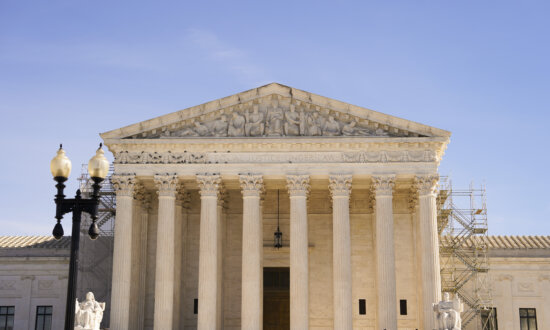The Supreme Court has rejected the Medicare fraud appeal of former healthcare executive Philip Esformes, whose sentence was commuted by President Donald Trump.
The prosecution involved what the U.S. Department of Justice (DOJ) described as the “largest health care fraud scheme ever charged” by the agency.
The Supreme Court rejected the petition for certiorari, or review, in Esformes v. United States in an unsigned order on Dec. 11. No justices dissented. The court did not explain its decision. At least four of the nine justices have to vote for a petition for it to advance to the oral argument stage.
The case received media attention earlier this year because the Biden administration announced it would retry Mr. Esformes on several hung counts on which the jury deadlocked. The re-prosecution was criticized by legal experts.
Convicted in a healthcare fraud scheme, Mr. Esformes was sentenced to 20 years in prison in 2019.
In December 2020, President Trump commuted to time served the sentence of Mr. Esformes who had been behind bars since he was arrested in 2016. Trump did not, however, pardon him for the hung counts, nor did he relieve him of the burden of paying millions of dollars in restitution and complying with an order of three years of supervised release.
The decision to retry Mr. Esformes is “a travesty of justice,” Rep. Andy Biggs (R-Ariz.) said at a congressional oversight hearing on June 22.
Although the DOJ argued Mr. Esformes’s actions cost the government $1.4 billion, the jury found the government’s actual losses totaled under $200,000, Mr. Biggs wrote.
“To rectify the role of the prosecutorial misconduct … President Trump commuted his sentence to time served, based in part on the recommendations of former U.S. Attorneys General Edwin Meese and Michael Mukasey, and former Deputy Attorney General Larry Thompson,” the congressman said.
“For years, the DOJ has unjustly and unlawfully targeted its political opponents,” the letter said.
The case “highlights what most Americans already know: Our nation has a two-tier justice system and it does not serve the American people fairly,” Mr. Biggs said.
Ignoring “clemencies granted by President Trump” is “a reckless move that is contrary to American history and further indicates how weaponized the DOJ has become.”
The network then provided “unnecessary and expensive medical services to those patients and fraudulently inflated bills with services that the facilities did not provide.”
After the patients were billed at the skilled nursing facilities, they were often sent to one of the network’s assisted living facilities.
“From there, [Mr. Esformes] often sold access to his patients to other corrupt health care providers in exchange for kickbacks.” Among those providers were laboratories, pharmacies, and partial hospitalization programs that often did not provide services to the patients.
After a jury trial in federal court, Mr. Esformes was convicted of one count of conspiring to receive and pay healthcare kickbacks, two counts of receiving kickbacks in connection with a federal healthcare program, four counts of paying kickbacks in connection with a federal healthcare program, one count of conspiring to commit money laundering, nine counts of money laundering, two counts of conspiring to commit federal program bribery, and one count of obstructing justice, U.S. Solicitor General Elizabeth Prelogar wrote in the brief.
He received a sentence of 240 months in prison to be followed by three years of supervised release. He was also ordered to pay $5.5 million in restitution and to forfeit $38.7 million.
While an appeal was pending, President Trump commuted the prison term to time served but left intact the remainder of his sentence. The U.S. Court of Appeals for the 11th Circuit upheld the convictions, restitution award, and judgment of forfeiture.
The complex healthcare fraud scheme went on for years “aided in large part by bribes that [Mr. Esformes] paid a state regulator – who was employed by the agency responsible for ensuring that the Esformes Network provided proper care and complied with Medicare and Medicaid requirements — to get advance notice of unannounced inspections at his facilities,” according to Ms. Prelogar.
Mr. Esformes directed his employees “to fix patient charts and hide potential violations before the inspections” and his confederates “also implemented money-laundering schemes designed to disguise the kickback payments and other unlawful proceeds and thereby avoid detection, which they successfully accomplished for over a decade.”
The 11th Circuit was correct to deny Mr. Esformes’s motions for relief, the government said.
“No further review is warranted.”
Despite this prosecutorial misconduct, the 11th Circuit upheld the conviction because he could not show that the government’s invasion of privilege actually prejudiced the outcome of his trial.
The 11th Circuit also affirmed the federal district court’s order requiring Mr. Esformes to forfeit $38.7 million based on the district court’s finding that the amount represented “property involved in [the] offense” or related to it.
Mr. Esformes asked the Supreme Court to consider whether a criminal defendant must demonstrate actual prejudice to establish a violation of the Sixth Amendment warranting dismissal of the indictment or disqualification of prosecutors for violating his attorney-client privilege.
Mr. Esformes also asked the Supreme Court to consider whether a court may order a criminal defendant to forfeit a sum of money based on a factual finding by a court, as opposed to a jury, that the amount of money was property that was tainted by the offense.
The Epoch Times reached out for comment to the attorney for Mr. Esformes, Matthew Nicholson of Williams and Connolly in Washington, and to the U.S. Department of Justice, but had received no comments as of press time.











